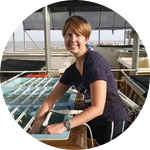About This Project
My project is focused on determining the ability of staghorn coral to adapt to warmer temperatures with climate change. Adaptation is possible only if a favorable trait exists within a population, meaning estimates of genetic variation are needed to determine whether populations of staghorn coral will be able to adapt to warmer temperatures. We are also seeking to identify easily measurable traits which can be used to identify temperature tolerant colonies in the field
Ask the Scientists
Join The DiscussionWhat is the context of this research?
Climate change is a significant threat to coral as they are highly susceptible to increased temperature. Surviving the rise in temperature is dependent on adaptation; therefore, estimates of genetic variation are needed to determine whether populations can adapt to higher temperatures. While some species have been identified as being more resistant, little is known about how different colonies of the same species vary in their temperature tolerance. The goal of this project is to measure the amount of genetic variation present in thermal tolerance in the staghorn coral, as well as to detect traits that identify colonies that are tolerant or susceptible to elevated temperatures. The results will help managers in identifying thermally tolerant colonies for outplanting into local populations.
What is the significance of this project?
Coral reefs are diverse ecosystems that provide shelter and nutrients for many organisms. They also provide important spawning and nursery habitats for fishery species. Climate change is a significant threat to corals as they are highly susceptible to increased temperature. Staghorn coral, the focus of this project, is found in the Florida Keys and Caribbean and has declined by 98% since 1980. The results of this study will help managers in identifying colonies which are least susceptible to temperature change; these colonies may then be used for outplanting into local populations. Transplanting thermally tolerant colonies in local populations could increase the frequency of these tolerant alleles, thereby increasing coral resilience to higher temperatures and conserving our reefs
What are the goals of the project?
Currently, I have already completed thermal stress tolerance experiments using staghorn coral fragments from different colonies collected from the Coral Restoration Foundation. I have collected tissue samples from these fragments after 12 hours of high temperature exposure and will be measuring protein concentration as well as gene expression of certain biomarkers of cellular stress in each sample. The protein and gene expression data will then be compared to the mean lifespan of these colonies when subjected to a long-term temperature stress. If there are certain markers that are correlated with survival, this data would aid coral managers in determining tolerant colonies in the field from tissue samples.
Budget
Currently, I have already completed thermal stress tolerance experiments using staghorn coral fragments from different colonies collected from the Coral Restoration Foundation. I have collected tissue samples from these fragments after 12 hours of high temperature exposure and will be measuring protein concentration as well as gene expression of certain biomarkers of cellular stress in each sample. The protein and gene expression data will then be compared to the mean lifespan of these colonies when subjected to a long-term temperature stress. If there are certain genes or proteins that are correlated with low or high survival, this data would aid coral reef managers in determining tolerant or susceptible colonies in the field from tissue samples alone. The budgeted items will go towards antibodies for protein detection and q-RT-PCR reagents for measuring gene expression.
Endorsed by
Meet the Team
Kelsey Yetsko
I've always been fascinated by how humans interact with and impact the marine environment. I grew up in Mount Pleasant, South Carolina, which is a small coastal town surrounded by a diversity of natural environments, including barrier islands, estuaries, wetlands, beaches, and maritime forests. It's a town that is also heavily dependent on tourism and has undergone increased expansion and development over the last 10 years, which has fueled my desire to pursue research towards conservation and management of marine resources as part of my career.
I received my Bachelor's degree in Marine Science and a minor in Data Science from the College of Charleston, where I was involved in a variety of different projects: measuring swimming performance of two species of killifish exposed to different salinity treatments, developing a computer pipeline to produce models to search for repetitive sequences of DNA in a freshwater snail genome (which happens to be an intermediate host for the parasite that causes Shistosomiasis disease), and determining whether mating call characteristics of the male plainfin midshipman fish were correlated to male quality.
Currently I am pursuing my Master's degree at the University of North Florida, and my research is focused on estimating the amount of genetic variation present in thermal tolerance in colonies of the threatened staghorn coral. I am also looking at potentially correlating the survival of different colonies of this species to the gene or protein expression of various markers of cellular stress. This research will better inform coral reef managers of which colonies of this species would be better suited for outplanting into local populations in the face of climate change. I've recently presented preliminary data from this research at the Benthic Ecology Meeting (March 2016).
Project Backers
- 8Backers
- 19%Funded
- $297Total Donations
- $33.00Average Donation

